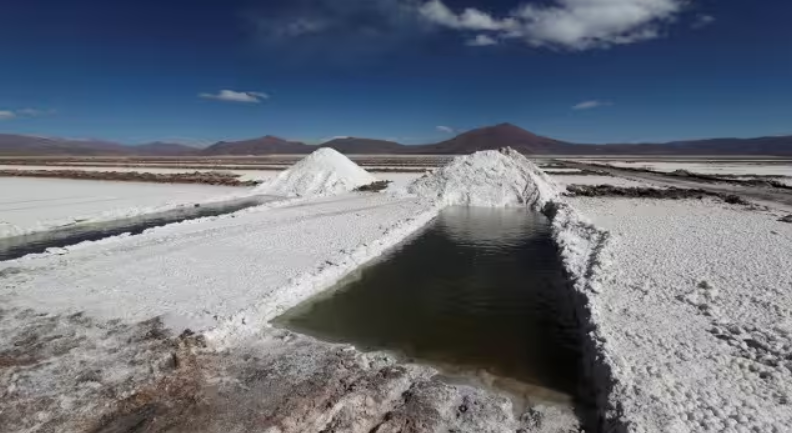Argentina’s lithium mining boom is gaining significant traction, with experts predicting that the country will rival, or even surpass, its neighbor Chile as the leading lithium producer in Latin America by 2030. This surge in interest has attracted investors and operators worldwide, eager to participate in Argentina’s thriving ventures.
Lithium, often referred to as “white gold” for its light color and high market value, is an essential component in the shift towards clean energy. Being the lightest metal on Earth, lithium finds widespread use in electric vehicles, cellphones, and rechargeable laptop batteries.
Political risk consultancy Eurasia Group analysts indicate that Argentina’s lithium production trajectory depends significantly on the upcoming presidential election and its impact on the country’s macroeconomic outlook, as well as the likelihood of interventionist policies.
“The stakes are high,” highlighted Eurasia Group analysts in a research note published on Sept. 18. “If Argentina’s lithium boom is hindered, it will not only impede the development of a robust lithium – and possibly battery – supply chain but also disrupt the progress of the global energy transition.”
Currently, Latin America supplies around 35% of the world’s lithium, with Chile (26%) and Argentina (6%) leading the charge. The region is estimated to hold over half of the world’s lithium reserves, primarily concentrated in Argentina (21%) and Chile (11%).
Currently, Argentina has two lithium extraction projects in Catamarca and Salta, both expected to double production by 2024. Additionally, there are ten ongoing construction projects. Analysts at Eurasia Group anticipate Argentina’s lithium production to grow fivefold next year and approximately tenfold by 2027 due to the escalating momentum in the country’s mining boom.
According to Eurasia Group, Argentina’s emerging lithium industry might face obstacles if global demand and prices drop below analysts’ expectations. However, they consider this scenario increasingly unlikely and emphasize that Argentina has the opportunity to embrace or lose.
During China’s annual “Golden Week” holiday, the prices of lithium carbonate traded at approximately 166,500 yuan ($23,124), a significant decline of almost 70% compared to the same period last year. Nevertheless, the future outlook suggests a surge in demand for lithium due to the increasing adoption of clean energy technologies. Some experts even anticipate record-high prices as the world grapples with a potential shortage.
Mariano Machado, principal analyst for the Americas at Verisk Maplecroft, a global risk intelligence firm, believes that Argentina has vast untapped mining resources. He compared Argentina’s potential to that of Chile, highlighting the importance of time in unlocking its lithium reserves. Machado added that investors and operators from various countries are showing interest in Argentina’s lithium sector.
Chile, presently the world’s second-largest lithium producer after Australia, also plays a significant role in refining this essential battery metal. In April, President Gabriel Boric announced that the Chilean state would acquire a majority stake in the country’s lithium industry, which generated concerns among certain business leaders. This move effectively requires private companies to partner with the government to exploit Chile’s lithium resources, leading to interpretations of quasi-nationalization.
When it comes to mining and lithium in Latin America, Chile often comes to mind. However, in the mining sector specifically, lithium becomes a problematic aspect due to the government’s interference, according to Verisk Maplecroft’s Machado.
In contrast, Argentina presents a different dynamic. While overall it may seem ambiguous, the country is seen as a bright spot in terms of lithium. It’s a rapidly changing situation that could lead to local communities expressing their desire to actively participate in the energy transition and transform their surroundings, as Machado pointed out.
Argentina has already gained prominence and will continue to do so as a hotbed for lithium. However, this expansion of the lithium industry within the country’s northern provinces raises concerns. Analysts have warned about potential protests regarding water access, environmental issues, and disputes with indigenous communities.
In fact, indigenous protesters from the Jujuy province recently traveled to Buenos Aires to defend their territories and natural resources after recent legislative changes granted greater access to indigenous lands for lithium mining companies.
China is anticipated to play a crucial role in the development of Argentina’s lithium industry in the near future. However, Western producers are expected to gain market share in the long run. Nonetheless, the upcoming presidential election might jeopardize Beijing’s position as a significant trading partner and a major creditor for infrastructure projects in Argentina.
(Source: Sam Meredith | CNBC)









